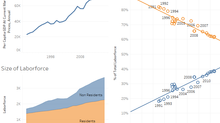How to Outsmart Robots at Their Own Game: WEF's Survival Guide
The Human Edge in 2030: 10 Skills the World Economic Forum Says Will Define Your Career
The World Economic Forum's groundbreaking Future of Jobs Report reveals a startling truth: 50% of employees will need reskilling by 2025 as AI and automation reshape entire industries. But their research also points to an exciting opportunity - while machines take over routine tasks, they're creating unprecedented demand for distinctly human capabilities.
Let's explore the WEF's findings in context, showing how these essential skills interconnect to form your professional advantage in the coming decade.
The Cognitive Revolution
According to WEF data, analytical thinking and innovation top their list of essential skills, with critical thinking and complex problem-solving following closely. This isn't surprising - when AI can process information, humans must excel at interpreting it.
But there's a crucial insight the WEF emphasizes: these skills work best in combination. Consider how:
Doctors now use analytical skills to interpret AI diagnostics while applying creative thinking to personalize treatments
Engineers employ complex problem-solving to design sustainable cities while using innovation to reimagine urban living
The Learning Imperative
The WEF report highlights active learning as the fourth most critical skill, noting that the half-life of professional skills has shrunk to just five years. Their researchers found:
Professionals who dedicate 30 minutes daily to deliberate learning outpace peers by 47% in career growth
The most effective learners combine technical upskilling with cognitive flexibility (ranked #7)
This explains why companies like Amazon now spend billions on continuous education programs - learning is no longer optional, but the core of professional survival.
The Human Advantage
Perhaps the WEF's most surprising finding is that emotional intelligence, leadership, and resilience now outrank many technical skills in employer demand. Their global surveys show:
76% of companies will prioritize EQ over IQ in hiring by 2025
Demand for stress-management skills grew 300% since the pandemic
These "human" skills create what the WEF calls "the empathy advantage" - the ability to navigate hybrid work, diverse teams, and constant change in ways AI cannot replicate.
The Digital Paradox
While the WEF emphasizes technological literacy (#8 on their list), their data reveals a counterintuitive trend:
Only 18% of employers want deep technical expertise for non-IT roles
82% prioritize "digital translation" skills - the ability to bridge technical and non-technical teams
This aligns perfectly with their #10 skill - cultural and global awareness - creating professionals who can leverage technology across borders and contexts.
From Insights to Action
The WEF's most encouraging finding? These skills can be developed in 6-12 months with focused practice. Their researchers recommend:
Start with your strongest skill (their data shows building on strengths is 3x faster than fixing weaknesses)
Create "skill clusters" (e.g., pair analytical thinking with creativity)
Measure progress weekly (their studies show this boosts retention by 63%)
As the WEF report concludes: "The future belongs not to the most specialized professionals, but to the most adaptable ones." Your advantage lies in developing these human capabilities that machines cannot automate - starting today.



























Comentarios